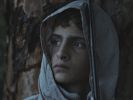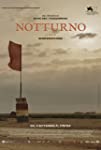Eye For Film >> Movies >> Notturno (2020) Film Review
Notturno
Reviewed by: Anne-Katrin Titze

Gianfranco Rosi’s Notturno (Nocturne), screening in the Main Slate of the New York Film Festival and the Journey section in London, comes nestled at the abyss. The chaotic, unstable border regions of Lebanon, Iraq, Kurdistan, and Syria are where this arresting important documentary was shot by Rosi during the past three years. As he did in his previous work, 2016 Berlin Film Festival winner of the Golden Bear, Fire At Sea (Fuocoammare), or the vigilant Sacro GRA (the first documentary ever to win the Golden Lion for Best Film at the Venice Film Festival in 2013), the images of great beauty shine light on man-made disasters, on cruelty and neglect. In Boatman (1993), Gianfranco Rosi’s first documentary, he captured a single day of a tourist on a boat which becomes a microcosm of the world. The film is beautiful and terrifying, making us laugh and shiver within a wave of the Ganges.
In Notturno, we are never told exactly where in the Middle East we are, nor are we given any background on the people. Rosi’s camera lets the light and the landscapes, the shattered houses and the fractured humanity speak for themselves. The humans do it verbally, in action and, more than anything, with their faces.

It starts with a small unit of soldiers running in formation through the blue light of morning around a courtyard of what could be a military base in the desert. A second unit runs behind them. Then a third, evermore enthusiastic one, then a fourth, and a fifth. The formation begins to look like a dance number with grunts and real guns, something choreographed by Busby Berkeley (who, no surprise, came from the military).
Next comes the sky and a fort. Women enter from the darkness, all dressed in black, only the first three have headscarves that are white. They walk deliberately, slowly, in and out of doors. No formation here, or maybe a loose one, as in a Pina Bausch piece. And those two unexpected associations with dance let you reflect on the traditionally different roles of women and men in wartime. Centuries and centuries of marching soldiers and mourning mothers and no end in sight.
One of the women stretches out her arms and caresses the pockmarked walls of the cell where her son was beaten, tortured and killed. “This prison is for the wicked. You were good,” she chants. The other women leave her alone in the room to grieve and so does the camera, withdrawing respectfully.
A man in camouflage with a rifle rides on a motorcycle alone in the countryside. Oil refineries flicker like little candles in the distance. He pulls a boat out of the reeds, gets into it, and paddles from a narrow creek covered in phragmites towards a larger river. We hear the distant sound of gunfire. There is a decoy duck in the water.
City lights, a town bar at night, military trucks on the road, boys playing in an alley, horses. One white horse stands in the traffic, cars go by behind it. Rosi lingers on the horse’s serene, knowing face in silence. It is a Balthazar moment out of Bresson or Nietzsche’s embrace of the Turin horse.
A man and a woman talk on a roof at night about the beauty of rain. Later she will help him dress, as though he were still a little boy, in a long white garment and a white cap. Not to go to sleep, no, but to go outside with his drum, like a town cryer or nightwatchman of old, to sing about Mohammed, “he who gave you the dawn, figs, and olives.” Two people swiftly ride by on horses, as if we were in a Western town, a motorcyclist does his tricks and here they are again, the gunfire sounds, in case you forgot that this is still a war zone.
Bombed out villages, camouflaged trucks, more soldiers. Women soldiers, a Peshmerga unit (Eva Husson’s Girls Of The Sun, starring Golshifteh Farahani and Emmanuelle Bercot, dramatises an all-female Yazidi squad), watching out for border security. The room where they rest has a window with a blue cloth, covering the top half, and the bright sunshine underneath. The effect is that of sudden displacement, the illusion of a snowy mountain landscape.
Rosi shows no battles but the readiness for them with rifles, patrols, trenches, bunkers, tanks. Always in-between conflict past and with conflict looming. Trucks are driving over a makeshift bridge - Christo’s Floating Piers in Andrey Paounov’s Walking On Water come to mind. Tents, mud, camps, women and children going about their daily lives. A panorama of human experiences in all regions of conflict, war, rubble and darkness.
A mint-green building houses the psychiatric ward where a play is to be staged “about our Homeland.” Five men and one woman are chosen to perform and are given their scripts to memorise (the woman gets hers last). The play speaks about losing all sense of safety.
Ali, a boy in yellow rain gear sits at the bow of a fishing boat at night. His stern face looks as if he had been painted by Caravaggio or Modigliani, depending on the light. When he returns home and takes off the wet rain gear, he drops it on the floor for his mother to pick up, a bit like the men do in Yasujiro Ozu’s films. He seems to be the oldest of many siblings who sleep on mattresses on the floor around the sofa where he rests. Ali is Rosi’s silent anchor in Notturno, the way the charismatic and talkative Samuele was in Fire At Sea as our guide to the landscape of Lampedusa. We think about the boys’ future when we see their present. What will be possible, which roads are already closed.
Carrying a rifle, Ali goes out into the wind. There is a majestic tree. Samuele would like it. And so would the palm tree sound recorder of Sacro GRA. Ali sits down under the tree. There is rumbling. Explosions? No, it is thunder and then comes the lightning and you realise that this is by far the largest tree around and that he really shouldn’t be underneath it. A universal experience for any child who ever played outside. The sky above the fields says after-the-rainstorm anyplace. But Ali brings back 11 small birds to feed his family. There is no father in sight, five of his siblings are doing homework, sitting on the carpet when he returns. He is head of household, who rents himself out to hunters for $5 a day.
Night for the soldiers means flashlights to check on empty, bombed out houses; the remnants of what used to be a family home is visible in a flash, then gone. A bedroom, rubble, emptied shelves, shattered cabinets; the pattern of the smashed window looking ornamental and composed in the dark.
A most important sequence of the film takes place in a classroom with small kids making drawings and speaking to their teacher about the trauma they experienced. A boy explains that his picture is about “when ISIS started exterminating us.” He ran to the mountains, he saw people die, he saw what no child should have to endure. A little girl with an even littler sister looking over her shoulder talks about being hit and how scared they were. Another girl draws blood and tears. These little humans, so poised, speak about being tortured and they can express that it was “for no reason”. All nine of them put their drawings up on the wall.
A sheer endless line of prisoners in red overalls follows. Are these men the ones responsible? Rosi doesn’t go there. He doesn’t have to. The audio messages of a captured woman to her mother seem almost too explicit and explanatory. Notturno is about what humans are capable of, with the focus on the talent to endure and manage even under the most dire of circumstances. A flooded road looks as if it is in the middle of collapsing, with chunks breaking away, turning the path into a waterfall. And the cars and trucks and a tractor with sheep just keep going and driving on. The film received the UNICEF Award at this year’s Venice Film Festival.
Reviewed on: 04 Oct 2020
















